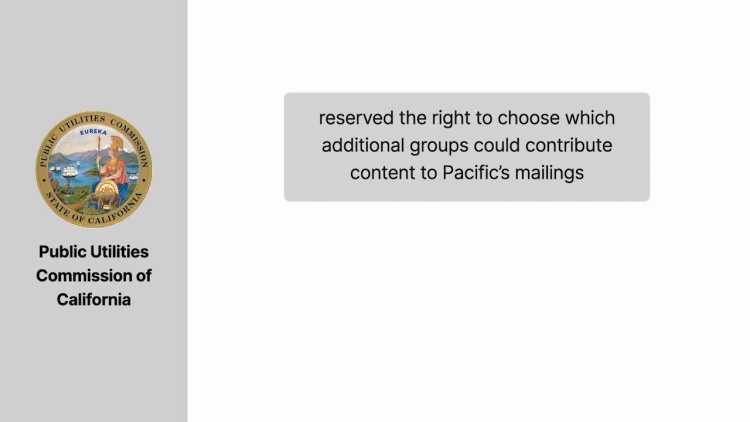Pacific Gas & Electric Co. v. Public Utilities Commission of California
United States Supreme Court
475 U.S. 1, 106 S.Ct. 903, 89 L.Ed.2d 1 (1986)
- Written by David Schleider, JD
Facts
The Pacific Gas & Electric Company (Pacific Gas) (plaintiff) included a periodical newsletter with its monthly bills to customers. In addition to general information about billing and utility services, the newsletter included political editorials, public interest stories, and energy conservation tips. The Public Utilities Commission of California (the Commission) (defendant) mandated that Pacific Gas allow an advocacy group called Toward Utility Rate Normalization (TURN) to include TURN’s content instead of the Pacific Gas newsletter at least four times a year. The Commission reasoned that the customers paid for the postage of the envelope, and thus, the additional space in the envelopes should be allocated between Pacific Gas and its consumers. The Commission did not place any restrictions on what content TURN could include and only required that TURN state views that were not those of Pacific Gas. The Commission did, however, reserve the right to decide which advocacy groups could include content in the future and deny groups based on the content of their speech. Pacific Gas sued, challenging the Commission’s regulation as an unconstitutional abridgement of Pacific Gas’s First Amendment rights.
Rule of Law
Issue
Holding and Reasoning (Powell, J.)
Concurrence (Marshall, J.)
Dissent (Rehnquist, J.)
Dissent (Stevens, J.)
What to do next…
Here's why 905,000 law students have relied on our case briefs:
- Written by law professors and practitioners, not other law students. 47,100 briefs, keyed to 995 casebooks. Top-notch customer support.
- The right amount of information, includes the facts, issues, rule of law, holding and reasoning, and any concurrences and dissents.
- Access in your classes, works on your mobile and tablet. Massive library of related video lessons and high quality multiple-choice questions.
- Easy to use, uniform format for every case brief. Written in plain English, not in legalese. Our briefs summarize and simplify; they don’t just repeat the court’s language.





